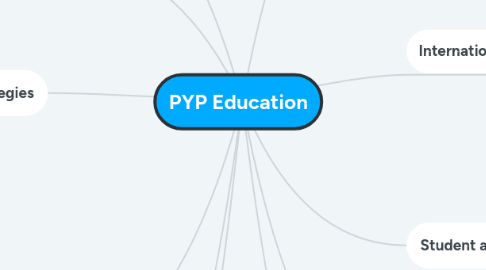PYP Education
by januarita dsouza


1. Assessment
1.1. Reflections
1.2. Learners action
2. Differentiation
2.1. Teaching styles
2.2. Simplified inquiry and task sheets
3. Strategies
3.1. Visible Thinking Routine
3.1.1. I see, I think, I wonder
3.1.2. Think, pair, share
3.1.3. Zoom in
3.1.4. 3-2-1 bridge
3.1.5. Connect, Exchange , Challenge
4. Learner Profile
4.1. Principled
4.2. Risk taker
4.3. Knowledgeable
4.4. Inquirer
4.5. Caring
4.6. Balanced
4.7. Communicator
4.8. Open-minded
4.9. Reflective
4.10. Thinker
5. Futuristic learner
5.1. Helps to nurture young minds into much more mindful and thoughtful beings.
5.2. Lifelong learners
6. Approaches to learning
6.1. Communication
6.2. Social
6.3. Research
6.4. Thinking
6.5. Self-management
7. Transdisciplinary learning
7.1. Language
7.2. Math
7.3. Social studies
7.4. Science
7.5. Art
7.6. PSPE
7.7. ICT
8. International Mindedness
8.1. Open to local and global inquiries
8.1.1. Cultural games to build on their knowledge
8.1.2. Can use the skills in a different engagement
8.2. Use of strategies to enhance our skills
8.2.1. Helps us to critically think about how we can connect to the wider community
9. Student agency
9.1. Voice
9.1.1. Problem solvers
9.2. Choice
9.2.1. To be flexible and open for ideas
9.3. Ownership
9.3.1. Student led conferences
10. Holistic development
10.1. Wellbeing
10.1.1. Physical
10.1.2. Social
10.1.3. Mental
10.1.4. Emotional
10.1.5. Cognitive
